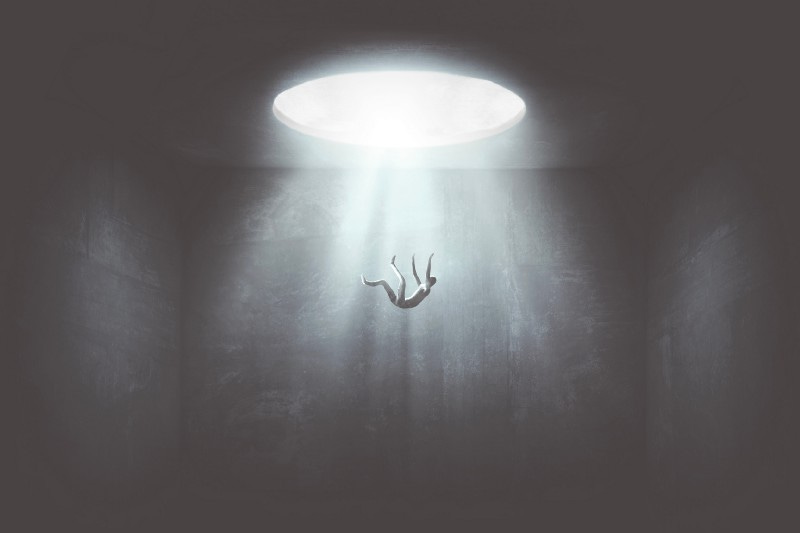Your Golden Shadow: Unearthing Submerged Potential
How life’s gilded glasses can draw you towards the gifts of others and blind you to your own.
How life’s gilded glasses can draw you towards the gifts of others and blind you to your own.
If you’re into psychology, self-awareness, and studying the subconscious–you’ve probably heard of Shadow Work.
Maybe it was on a Tinder date, when the person opposite you candidly asked about your traumas or if there’s anything they should know about you.
Or maybe you’ve fallen down a TrueCrime rabbit hole and wondered how people are capable of doing terrible things, and Freudian google searches later you begin to see how.
For many Shadow Work is their first step into depth psychology, but it’s something most people don’t understand. Especially as it relates to working with the ‘darkness within.’
Carl Jung, the founder of analytical psychology, coined the term ‘Shadow Work’ and he considered your shadow to be ‘the person you don’t want to be.’
Making Shadow Work what you do to form a better relationship with this negative could-be version of yourself.
Maybe it’s for this reason that Shadow Work is primarily associated with working with the ‘darkness within’ and dealing with repressed unconscious desires. But in reality, your ‘Shadow’ is simply everything about yourself that is outside of your awareness.
Which happens to be much of you.
So, of course, that’s going to include your dark side. But there’s more to you and it than that, and anything that involves relating to your subconscious mind to uncover parts of yourself that you repress and hide from yourself is ‘Shadow Work.’
Shadow work is essential for, becoming more self-loving, forgiving, and self-accepting, but it isn’t for the faint of heart. And there are already many great resources out there on Shadow Work.
Which is why I want to dive into a side shadow work that it’s hard to find much on…
You see, many people assume that if something is hidden from them, it must be bad.
But that’s just not true.
In fact, much of what is good about you is hidden from you, too.
Perhaps more good is hidden from you about you than bad.
And that’s the idea I find most fascinating about Shadow Work, which Jung coined later as:
The Golden Shadow
What is The Golden Shadow?
The Golden Shadow is not nearly as popularized as the idea of Shadow Work itself — though give it another 5–10 years, as more people rapidly become more self-aware.
But in terms of achieving peak performance, inner-fulfillment, and true well-being The Golden Shadow is perhaps more important than learning to embrace one’s dark side.
The Golden Shadow, as Carl Jung put it is:
“Your submerged creative potential.”
Which is a very interesting choice of words. Like all aspects of your shadow, your golden shadow is a part of you and is self-suppressed.
Except, unlike the shadow, if it were to emerge it would be a significantly positive experience in your life.
In many ways, perceiving, understanding, and accepting your Shadow is necessary, so that you discover your Golden Shadow alongside it. It’s a bitter pill to swallow when you discover you have a shadow side, which will always be a part of you. But it’s worth it to know you have a golden shadow. And if you’re really open to perceiving both, without judgment or expectation, you’ll be amazed about what you discover about yourself.
Being open to perceiving both, while learning to differentiate the two is paramount to self-actualizing.
Though, this is easier said than done.
For one, it’s easier to see someone else’s Shadow or Golden Shadow, than it is to see your own. Which is hardly fair.
Second, it is already scary to know you could be capable of terrible things. And to have to acknowledge that potential in your Shadow.
But it’s downright terrifying to know you are capable of more than you are settling for now.
And that’s a realization that confrontation with the Golden Shadow will bring you.
But along with that bitter pill, comes good medicine that is key to your self-actualization.
Life’s Gilded Lens: Seeing the Best of Ourselves in Others
The easiest way to discover your Golden Shadow is through your positive perceptions and judgments of others.
Just like with your Shadow, that includes your darkly repressed judgments of yourself, and your thoughts about the people, places, and things around you, can reveal your feelings about what is going on within you.
For instance, if you notice you are consistently judging others’ bodies — you may need to be more accepting of your own body.
Someone who is not actively dealing with their insecurities or traumas is not going to judge others unnecessarily when they could be putting their attention somewhere more positive. But those who are, are going to notice these qualities and traits in others around them because they are the ones walking around with a wound that needs healing.
Noticing your darkly repressed judgments of yourself in the things you commonly see and judge about others is basically like playing an Uno reverse card on yourself.
And paying attention to your thoughts in this way can help you gain awareness of these aspects of yourself which are hidden from you.
Coming into contact with your Golden Shadow can happen similarly, except by spotting your positive judgments and celebrations of others.
Many think that the time to be self-aware is over when their thoughts consist primarily of things that appear positive on the surface and that when their focus is on the positive traits in others that they are off the hook. As if to think “if it isn’t broken, don’t fix it.”
But actually, there is much to discover about yourself in the positive traits you notice in others.
Many truly gifted, talented, and incredible people suffer from self-esteem. You could even say every person suffers from struggles with self-esteem at some point in their lives. And in many of these cases, people will deny themselves a full expression of their gifts, talents, or capabilities out of fear related to doing that.
Whether it’s the fear of judgment from others who would not expect this behavior in us. Or simply a fear it may go wrong.
Whatever it is, there’s a limiter in some people’s behavior not fully allowing them to express something that is a, perhaps unchangeable, part of who they are. And instead of nurturing their gifts themselves, they deny them and even encourage them in others. At best, getting off the sidelines to support others in doing what we crave most of all.
This is one of the dangers of the Golden Shadow: we see the thing we desire in others, and overly celebrate it in them, while denying it in ourselves.
A rampant Golden Shadow is a lot harder to notice than a standard Shadow because if you’re repressed darkness is lashing out — chances are you’re acting like a jerk, and the thoughts you’re having aren’t making you feel very good.
Not so with The Golden Shadow.
It feels good to feed the Golden Shadow, and it makes others feel good, at least at first. The toll the Golden Shadow takes is over years, even decades. And it doesn’t so much take from you, as much as it stops good things from ever happening at all.
Unearthing Submerged Potential
Remember what I was saying about bitter pills?
But the good medicine here is: if you notice yourself over celebrating others, or easily seeing the good in others, while you struggle to see it in yourself.
Because we love something, it is easy to recognize it in others.
And it’s easy to celebrate in others, because we know how special that thing is — because we have it in us, too. And because what we’re doing appears good and necessary it is easy to do too much of it, at the cost of yourself.
Now, while seeing the negative and positive in others is a spectrum — the thing to pay attention to is whether you are doing it and what thoughts are repeating themselves.
I’m not at all saying you should be unkind and unenthusiastic when it comes to congratulating or complimenting others.
But I am saying that it can be very humbling each time you have the impulse to think anything about others to ask yourself, “Does this also apply to me?”
Positive, or negative, there’s a shadow in your that will always be a part of you. And this is one of your few ways to become more aware of it in a waking state.
The reason these patterns repeat themselves, is these shadows within us are trying to express themselves. We recognize them outside of ourselves frequently, because they are always a part of us. And when they need our attention, they get it, just not directly.
Many people won’t ask themselves this simple question, and many more won’t admit it when it’s true. Because if it is true, that would require someone to change — for starters, by judging others less and being kinder to themselves more often. And there’s a pain in becoming more aware of something in ourselves that we aren’t ready to change.
The humbling truth of shadow work is that our shadows are not just a part of us — they are us. They may not be the walking, drinking, thinking version of us that we experience life as.
But they are a part of who we are.
And while they are our shadows, unchecked they can show up as us in the world. The only way to stop that from happening is to start by accepting that they exist in the first place.
Which is also why Jung said, “The most terrifying thing is to accept oneself completely.”
On the other side of that fear, is everything there is to discover about us.
—
Colton is an author, and entrepreneur and shares 4 of the most powerful methods on how to raise your self-awareness, come into contact with your shadows, and self-actualize in his free workshop: Unlocking Hidden Power — which you can check out here now:






